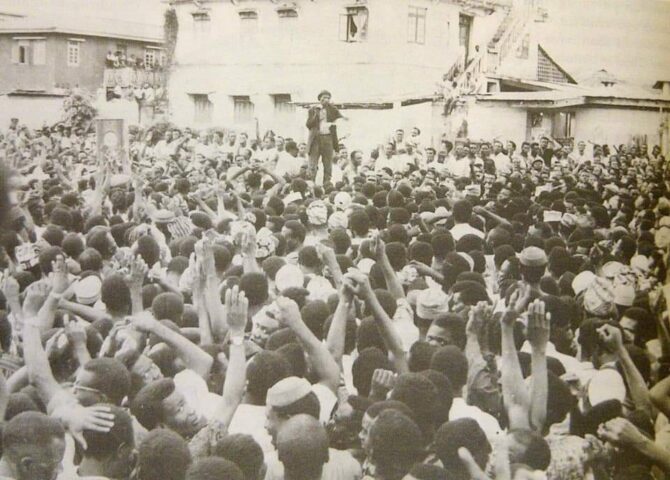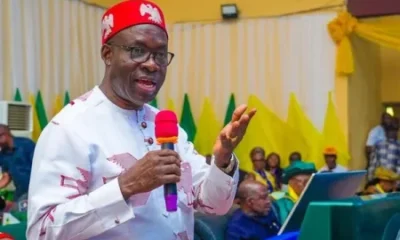Breaking News
1945 Nigerian General Strike: How over 100,000 Nigerian Workers Challenged the Government

In 1945, a pivotal moment in Nigeria’s history unfolded with the initiation of the first general strike, a nationwide labor movement led by thousands of workers later known in history as the 1945 Nigerian General Strike.. Read ..Full.. Article.. .
This strike marked a turning point in Nigeria’s fight for independence from British colonial rule. The strike began with railway workers, spreading to encompass workers from other industries, including dock and civil service workers, with support even coming from employees at private firms.
Historical Background
At the time, Nigeria was under British colonial rule, which had persisted since 1914 and would continue until 1960. The Second World War had left the country grappling with high inflation, rising prices, and stagnant wage growth. The government’s efforts to control prices had proven largely ineffective.
A coalition of workers, known as the Joint Executive of Government Technical Workers, made their demands clear on March 22, 1945. They sought a minimum wage of two shillings and six pence and a 50 percent increase in the Cost of Living Allowance (COLA), retroactive to April 1, 1944. Unfortunately, the colonial government denied these demands on May 2, 1945.
In response, the workers issued a statement, threatening to proceed on a general and lasting strike if their demands weren’t met by Thursday, June 21, 1945.
Despite negotiations between the colonial government and a delegation of workers led by their President, T.A. Bankole, on May 30, 1945, no resolution was reached. Just twelve days later, the colonial government made an offer that only slightly adjusted their previous position. This offer was promptly rejected.
On June 2, 1945, in a strategic move, the British Colonialists released Michael Imoudu, a prominent labor leader who had been in prison since 1943, perhaps hoping to pacify the angry workers. However, Imoudu’s actions acted as a catalyst for the strike, and as labor historian Wogu Ananaba noted, “There is little doubt that but for Imoudu’s activities there might have been no General Strike on June 22.”
The Commencement of the Strike
On June 22, the strike began with railway workers signaling its start in Lagos by blowing train whistles at midnight. While not all workers initially joined the strike, the support of numerous nationalists, including Herbert Macaulay, Nnamdi Azikiwe, Adunni Oluwole, and Obafemi Awolowo, boosted the strikers’ morale. Imoudu continued to play a prominent role in encouraging workers to join the movement.
Michael Imoudu
Michael Imoudu and a crowd of demonstrators
Some strikers began to confront those who tried to continue working. The strike, which originated with railway workers, quickly spread throughout the colony, with local labor leaders playing a crucial role in its management.
Government’s Efforts and the Strike’s Impact
The colonial government made several attempts to persuade the workers to end the strike, including spreading propaganda and enlisting labor leaders to mediate negotiations. These efforts, however, proved largely ineffective, and.. Read . .More —
-

 Breaking News5 months ago
Breaking News5 months agoBREAKING NEWS: Labour Congress Call For Review Of Minimum Wage, Propose N150,000 Pay For Lagos Workers
-

 Entertainment5 months ago
Entertainment5 months agoBurna Boy Used To Squat In My House – Cubana Chief Priest
-

 Breaking News5 months ago
Breaking News5 months agoALLEGED BLASPHEMY: Angry Youths Kill Female Food Seller In Niger State
-

 Entertainment5 months ago
Entertainment5 months agoBBNaija S10: I Was Prevented From Returning To Show Despite Being Medically Fit – Sabrina
-

 Entertainment5 months ago
Entertainment5 months agoPopular Nigerian Comedian, Josh2Funny And Wife, Bina, Welcome Third Son
-

 Entertainment5 months ago
Entertainment5 months ago[VIDEO] Ibom Air Incident: Comfort Emmanson Opens Up on Traumatic Experience
-

 Breaking News5 months ago
Breaking News5 months agoBREAKING: CAC Extends New Fee Regime To October 1
-

 Entertainment5 months ago
Entertainment5 months agoMedia Personality Toke Makinwa Make Confession On Fearful Pregnancy Journey, Shares Fresh Maternity Shoot
-

 Breaking News5 months ago
Breaking News5 months agoBREAKING: 1 Israeli Soldier Dead, 9 Injured, 4 Missing
-

 Politics5 months ago
Politics5 months agoSoludo Mocks Obi, Declares ADC and LP “Dead” After Anambra By-elections
-

 Breaking News5 months ago
Breaking News5 months agoBukuyum: Air Operations Force Bandits To Release 70 Kidnapped Victims In Zamfara
-

 Breaking News5 months ago
Breaking News5 months agoBREAKING: Hamas Captures Israeli Soldiers in Gaza
